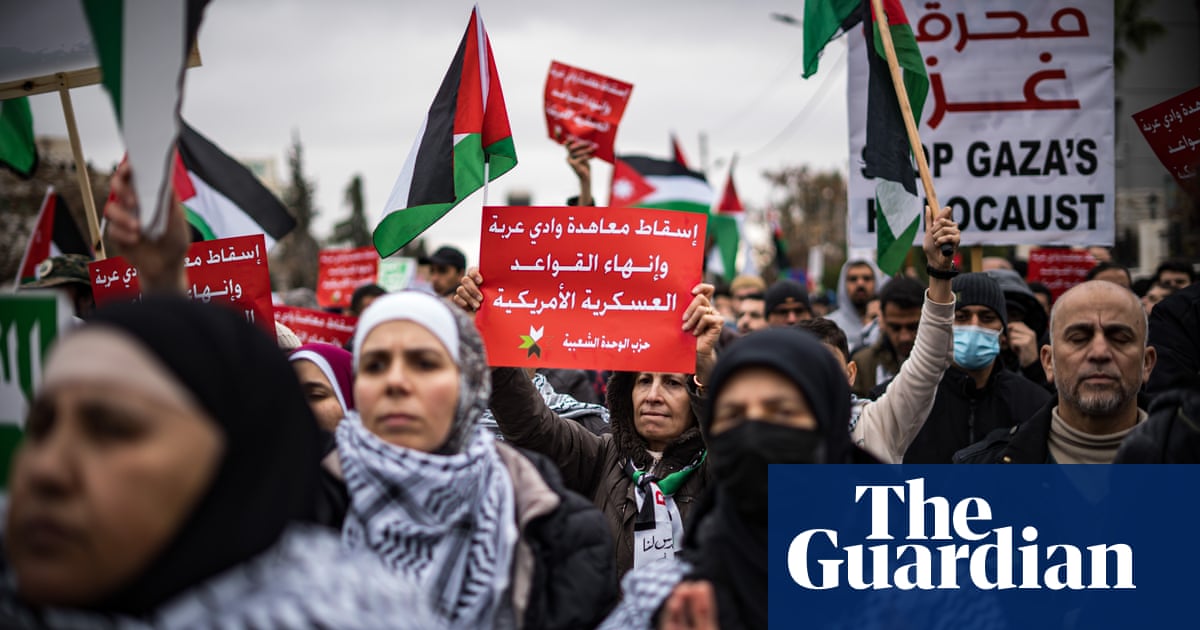Jordan’s interior ministry announced on Wednesday that it was shutting down the Jordanian branch of theMuslim Brotherhood, and banned promoting the “ideology” or being a member of the Islamist political group.
The ban came a week afterJordansaid they had arrested 16 members of the Muslim Brotherhood they accused of threatening national security by training militants, making explosives and plotting to strike targets in Jordan with rockets and drones.
The Muslim Brotherhood denied any involvement with the alleged attack.
Interior minister Mazen Farraya connected the banning of the Muslim Brotherhood with the alleged plot, saying members of the group attempted to “smuggle and destroy large quantities of documents from its headquarters” on the same night that authorities carried out arrests.
Farraya said that the Muslim Brotherhood had been “working in secret and undertaking activities that threatened to undermine stability, security and national unity.”.
The Muslim Brotherhood is a political Islamist group founded in Cairo in 1928 which has branches across the Middle East, including in Jordan, Lebanon, Syria and Palestine.
Jordan’s move to ban the Jordanian branch of the Muslim Brotherhood comes after years of a steadily tightening a crackdown on the group.
The group, the political wing of which the Islamic Action Front (IAF) won 31 out of 138 parliamentary seats in elections last September, is the largest and most popular opposition organisation in Jordan.
The group has criticised the Jordanian government’s 1994 peace treaty with Israel, which is largely unpopular among the country’s population, the majority of which are of Palestinian descent.
The group also took an active role in demonstrations in Amman, Jordan’s capital, which saw thousands come out in protest against the war in Gaza over the months following 7 October 2023.
Last year, Human Rights Watch criticised Jordanian authorities for arresting and harassing “scores of Jordanians” who participated in the pro-Palestine protests or posted online in support of them.
Jordan’s government has been outspoken against the Israeli war in Gaza, expelling the country’s ambassador from Jordan and consistently calling for an end to the humanitarian siege on the territory.
Protesters, however, have called for the government to scrap the peace treaty between the two countries, cancel an unpopular gas deal end all exports to Israel.
The Muslim Brotherhood and its ally in Gaza, Hamas, has experienced a surge in popularity among Jordanians since the start of Israel’s war in Gaza. Jordan expelled Hamas’s leadership and shut its offices in 1999 and views the growing popularity among its own population for the Islamist group warily.
Authorities searched the headquarters and branches of the IAF across the country on Wednesday. A week earlier authorities arrested Khaled al-Johani, the office director of the IAF.Despite the ban of the Muslim Brotherhood, the IAF’s work would continue, Wael Sakka, the party’s general secretary told the Guardian.
“Our party has no organisational link with any other entity and we are in compliance with the provisions of the constitution, the political parties law and Jordanian law,” Sakka said.
Jordan’s interior minister said in a statement that the government was committed to guaranteeing freedom of expression and political activity in accordance with relevant laws. The country’s cybercrime unit later said that publishing anything on social media relating to the Muslim Brotherhood would be met with legal action.
Rights groups have warned of a steady erosion of civic space in Jordan in recent years, with rights monitor Freedom House downgrading the country from “Partially Free” to “Not Free” in 2021 due to its crackdown on civil society.
A passing of a new cybercrime law in 2023 which criminalised speech “which undermined national unity”, among other things, on social media platforms also drew outrage from human rights groups.
